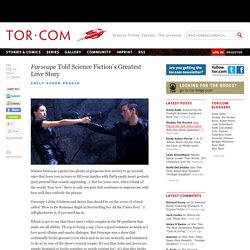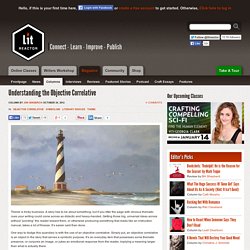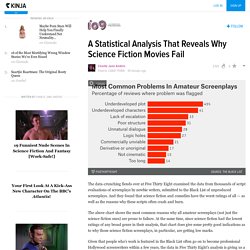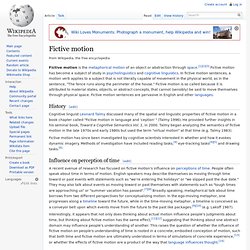

4. plot. 3. worldbuilding. 2. characters. 1. Farscape Told Science Fiction’s Greatest Love Story. Science fiction as a genre has plenty of gorgeous love stories to go around, ones that leave you in tears or fill your insides with fluffy candy heart goulash (just pretend that sounds appetizing...).

But for years now, when I think of the words “true love” there is only one pair that continues to impress me with how well they embody the phrase. Farscape’s John Crichton and Aeryn Sun should be on the cover of a book called “How to Do Romance Right in Storytelling For All the Times Ever.” I will ghostwrite it, if you need me to. Understanding the Objective Correlative. Theme is tricky business.

A story has to be about something, but if you litter the page with obvious thematic cues your writing could come across as didactic and heavy-handed. Getting those big, universal ideas across without “pointing” the reader toward them, or otherwise producing something that reads like an instruction manual, takes a lot of finesse. It’s easier said than done. One way to dodge this quandary is with the use of an objective correlative. Simply put, an objective correlative is an object in the story that serves a symbolic purpose. Objective correlatives are exercises in economy, but more importantly, they allow writers to communicate universal concepts tastefully and subtlety. You can find objective correlatives everywhere in books and movies. The objective correlative is a quintessentially Modernist device. There are other benefits in using objective correlatives.
It also gives your story a lot of organizational power. Readers aren’t dumb. A Statistical Analysis That Reveals Why Science Fiction Movies Fail. Kinja is in read-only mode.

We are working to restore service. And they found that science fiction and comedies have the highest failure rate, as well as the reasons why these movies often crash and burn. Should Television Shows Be Less Concerned With Continuity? The Paradoxes That Define Our Relationship With Science Fiction. Is the "not enough explanation, too much explanation" true?

There is certainly a "too much information" level, but the explanation should inform the world, create future and further plots and story points. The best SF stories include detailed explanations; otherwise you're not going to get a sense of the world, a sense of why this struggle or that difficulty is significant. Without it, the writer is limited in their scope, or forced to do a quick "this is important because" bit before (or just after) it becomes important; which is just bushleague. These days, with the amount of SF which seems allergic to explanation and world building (for example, what happens with the Factionless kids in Divergent?)
, I would say that if you think you haven't delivered enough of an explanation it's because you need to do more. I guess what I'm saying is, either explain stuff or handwave it — but don't provide partial explanations of things you actually don't intend to delve into in detail. How To Make A Science Fiction TV Show Part 1: Getting The Greenlight. Given the financial risk of making pilots that don't get shown, I wonder why it's become so rare to have 2-hour pilots.

There used to be a lot of those, which could be shown as TV movies if the series didn't get picked up, or that started out as movies that were backdoor pilots. But then, come to think of it, TV movies in general have pretty much ceased to exist except on some cable networks (Syfy being one). I guess direct-to-DVD movies kind of replaced them. Back in the day, networks often used to have "showcase" nights where they'd burn off failed pilots. We don't see those anymore either. Fictive motion. History[edit] Cognitive linguist Leonard Talmy discussed many of the spatial and linguistic properties of fictive motion in a book chapter called "Fictive motion in language and 'ception'" (Talmy 1996).

He provided further insights in his seminal book, Toward a Cognitive Semantics Vol. 1, in 2000. Talmy began analyzing the semantics of fictive motion in the late 1970s and early 1980s but used the term "virtual motion" at that time (e.g. Talmy 1983). Fictive motion has since been investigated by cognitive scientists interested in whether and how it evokes dynamic imagery. Influence on perception of time[edit] 5 Ways to Get Your Name Published Online. There are plenty of us who want to be writers.

Having your name on a published piece is an amazing feeling. Some of us want the fame, others want the bragging rights, and some just think it’s great to see your name on something. The good news is that you don’t have to go through a traditional publisher and create a full-length novel that gets sold in bookstores to be published. Aside from self-publishing a print book, there are various ways of getting yourself published online that will give you similar personal satisfaction as traditional authorship (minus holding the pages in your hands.) Main/Like Reality Unless Noted. Main/Lampshade Hanging. Main/Necessary Weasel. Main/Willing Suspension of Disbelief. Main/Medium Awareness.